2019届中考英语复习题型1语法与情景对话课件1
- 格式:ppt
- 大小:1.09 MB
- 文档页数:5
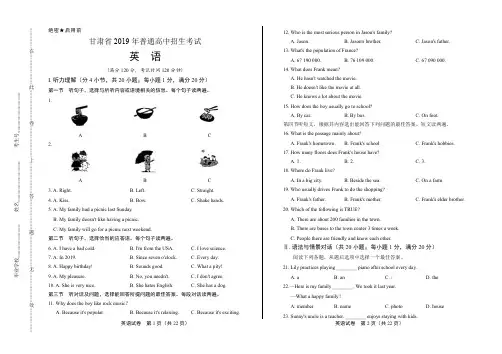
绝密★启用前甘肃省2019年普通高中招生考试英 语(满分120分,考试时间120分钟)Ι.听力理解(分4小节,共20小题;每小题1分,满分20分)第一节 听句子,选择与所听内容或语境相关的信息。
每个句子读两遍。
1.ABC2.AB C3. A. Right. B. Left. C. Straight.4. A. Kiss.B. Bow.C. Shake hands.5. A. My family had a picnic last Sunday. B. My family doesn't like having a picnic. C. My family will go for a picnic next weekend.第二节 听句子,选择恰当的应答语。
每个句子读两遍。
6. A. I have a bad cold. B. I'm from the USA. C. I love science. 7. A. In 2019.B. Since seven o'clock.C. Every day. 8. A. Happy birthday! B. Sounds good.C. What a pity! 9. A. My pleasure.B. No, you needn't.C. I don't agree. 10. A. She is very nice.B. She hates English.C. She has a dog.第三节 听对话及问题,选择能回答所提问题的最佳答案。
每段对话读两遍。
11. Why does the boy like rock music ? A. Because it's popular.B. Because it's relaxing.C. Because it's exciting.12. Who is the most serious person in Jason's family?A. Jason.B. Jason's brother.C. Jason's father. 13. What's the population of France? A. 67 190 000.B. 76 109 000.C. 67 090 000.14. What does Frank mean? A. He hasn't watched the movie. B. He doesn't like the movie at all. C. He knows a lot about the movie. 15. How does the boy usually go to school? A. By car.B. By bus.C. On foot.第四节听短文,根据其内容选出能回答下列问题的最佳答案。
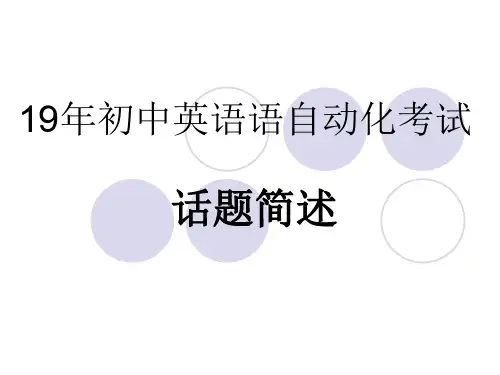
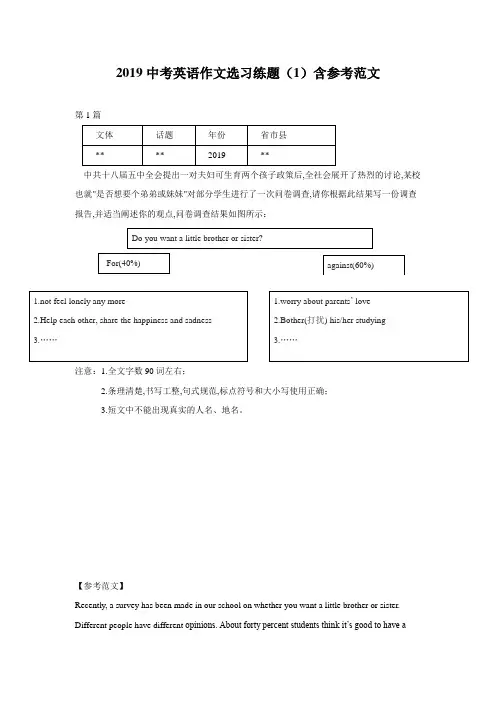
2019中考英语作文选习练题(1)含参考范文第1篇中共十八届五中全会提出一对夫妇可生育两个孩子政策后,全社会展开了热烈的讨论,某校也就"是否想要个弟弟或妹妹"对部分学生进行了一次问卷调查,请你根据此结果写一份调查报告,并适当阐述你的观点,问卷调查结果如图所示:注意:1.全文字数90词左右;2.条理清楚,书写工整,句式规范,标点符号和大小写使用正确; 3.短文中不能出现真实的人名、地名。
____________________________________________________________________________________________________________________________________________________________________________________________________________________________________________________________________________________________________________________________________________________________________________________________________________________________________________________________________________________________________________________________________________________________________________________________________ 【参考范文】Recently, a survey has been made in our school on whether you want a little brother or sister. Different people have different opinions. About forty percent students think it’s good to have abrother or sister. They can help each other and share the happiness and sadness together. And they won’t feel lonely any more. What’s more, they think they’ll get more freedom. But others disagree. They think they won’t get used to the change. They also worry that their parents won’t love them as much as before. Besides, they’re afraid that the new baby will be so noisy that it may bother their study. In my opinion, it’s hard to say whether it’s good or bad to have a brother or sister. But we should respect our parents’ choic es. After all, they’re the persons who will make the final decision.第2篇你马上就要毕业了,暑假就要来临。
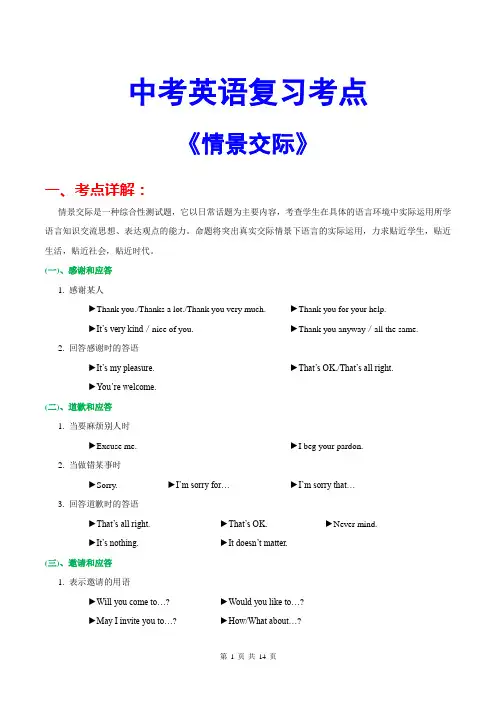
中考英语复习考点《情景交际》一、考点详解:情景交际是一种综合性测试题,它以日常话题为主要内容,考查学生在具体的语言环境中实际运用所学语言知识交流思想、表达观点的能力。
命题将突出真实交际情景下语言的实际运用,力求贴近学生,贴近生活,贴近社会,贴近时代。
(一)、感谢和应答1. 感谢某人►Thank you./Thanks a lot./Thank you very much. ►Thank you for your help.►It’s very kind/nice of you. ►Thank you anyway/all the same.2. 回答感谢时的答语►It’s my pleasure.►That’s OK./That’s all right.►You’re welcome.(二)、道歉和应答1. 当要麻烦别人时►Excuse me. ►I beg your pardon.2. 当做错某事时►Sorry. ►I’m sorry for…►I’m sorry that…3. 回答道歉时的答语►That’s all right.►That’s OK. ►Never mind.►It’s nothing.►It doesn’t matter.(三)、邀请和应答1. 表示邀请的用语►Will you come to…? ►Would you like to…?►May I invite you to…? ►How/What about…?2. 接受邀请时的答语►Yes, I’d like /love to.►Yes. It’s very kind of you.►That would be nice.3. 拒绝邀请时的答语►No, thank you. ►I’d love /like to,but…(四)、请求和应答1. 表请求用语►May I…? ►Can/Could I…? ►Would you mind if…?2. 表肯定的答语►Sure. /Certainly. ►Yes, do please.►That’s all right.►Of course, you can.3. 表否定的答语►I’m afraid not.►I’m sorry, but you mustn’t/can’t.►You’d better not.(五)、祝愿、祝贺和应答1. 祝贺用语►Have a good day/time! ►Have a good journey/trip!►Good luck! ►Enjoy yourself!►Best wishes to you! ►Happy New Year!►Merry Christmas! ►Happy birthday!►Congratulations! ►Well done!2. 应答用语►Thank you. ►You, too. ►The same to you.(六)、提供帮助和应答1. 提供帮助►Can I help you? ►Would you like me to help you?►What can I do for you? ►Let me help you.2. 肯定答语►Yes, please./Yes, thanks. ►Thank you for your help.►Thank you. ►That would be nice.3. 否定答语►No, thanks/thank you. ►That’s very kind/nice of you, but I can manage it myself.(七)、劝告和建议►You’d better…►Why not…?►How/What about…? ►Shall we…? ►You shouldn’t…(八)、打电话1. 拨电话方的交际用语►Could/May/Can I speak to...please? ►Who’s that(speaking)?►This is…(speaking). ►Could you ask him/her to call me back?►I’m calling to tell/ask you to…2. 接电话方的交际用语►Hold on(for a moment), please.►I’m sorry/afraid he’s/she’s out at the moment/right now.►Can I take a message (for you)?(九)、购物1. 营业员常用的交际用语►CanI help you?/What can I do for you? ►How many/much… do you want?►What about this one? ►What colour/size/kind do you like/want?►I’m afraid we haven’t got any…in that siz e at the moment.►Here you are.2. 顾客常用的交际用语►I want /would like to buy some. . . (for. . . ) ►I’m looking for. . .►I would like/want two kilos of... ►I like the colour,but it’s/they’re too. . .►It’s great,but it’s not. . . enough.►Have you got any other kind/colour/size?►That looks nice/great. ►Have you got anything cheaper?►How much does it cost? ►Can/May I try them/it on,please?(十)、看病1. 医生常用交际用语►What’s wrong with you? /What’s tihe matter?/What’s up?►How long have you been like this? ►Have you taken your temperature?►Have you had anything to eat this morning?►There’s nothing serious.►Take this medicine and stay in bed for a few days.►You will get better soon. ►You will be all right/well soon.2. 病人常用的交际用语►I have got a headache/cough.►I’m not feeling well./l don’t feel very well./I feel terrible►There’s something wrong with...(十一)、情感1. 高兴►How wonderful/nice! ►That’s lovely/great/wonderful!►I’m pleased to know that.2. 惊奇►Really? ►Oh dear!►Is that so? ►What a surprise!►How nice to see you! ►How surprising!►I’m surprised.3. 满意►Good! ►Well done! ►Perfect!►That’s fine.►That’s better.►That’s good enough.4. 忧虑►What’s wrong?►What’s the matter?►Anything wrong? ►What should we do?5. 遗憾与同情►I’m so sorry!►It’s a great pity!►What a shame/pity! ►That’s too bad!►I’m sorry to hear that.二、分法技巧:情景交际题之解题思路要做好这类题目,关键是平时要养成讲英语的良好习惯,努力提高口语水平,熟练掌握日常会话项目中常用的问答语。

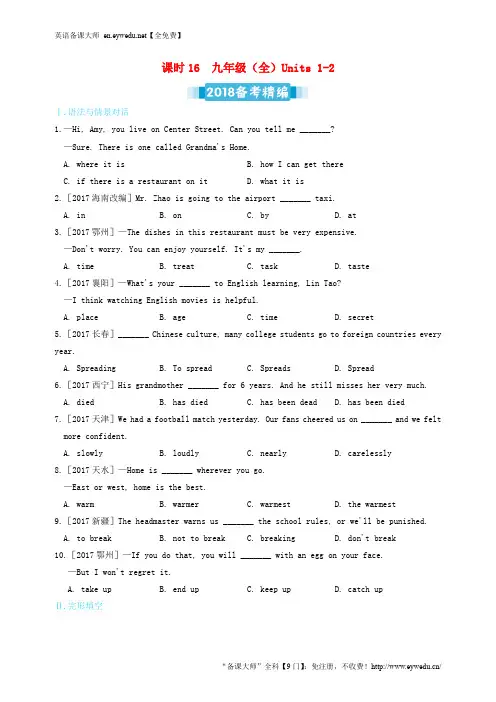
课时16 九年级(全)Units 1-2Ⅰ.语法与情景对话1.—Hi, Amy, you live on Center Street. Can you tell me _______?—Sure. There is one called Grandma's Home.A. where it isB. how I can get thereC. if there is a restaurant on itD. what it is2.[2017海南改编]Mr. Zhao is going to the airport _______ taxi.A. inB. onC. byD. at3.[2017鄂州]—The dishes in this restaurant must be very expensive.—Don't worry. You can enjoy yourself. It's my _______.A. timeB. treatC. taskD. taste4.[2017襄阳]—What's your _______ to English learning, Lin Tao?—I think watching English movies is helpful.A. placeB. ageC. timeD. secret5.[2017长春]_______ Chinese culture, many college students go to foreign countries every year.A. SpreadingB. To spreadC. SpreadsD. Spread6.[2017西宁]His grandmother _______ for 6 years. And he still misses her very much.A. diedB. has diedC. has been deadD. has been died7.[2017天津]We had a football match yesterday. Our fans cheered us on _______ and we feltmore confident.A. slowlyB. loudlyC. nearlyD. carelessly8.[2017天水]—Home is _______ wherever you go.—East or west, home is the best.A. warmB. warmerC. warmestD. the warmest9.[2017新疆]The headmaster warns us _______ the school rules, or we'll be punished.A. to breakB. not to breakC. breakingD. don't break10.[2017鄂州]—If you do that, you will _______ with an egg on your face.—But I won't regret it.A. take upB. end upC. keep upD. catch upⅡ.完形填空The Spring Festival is one of the most important festivals in China. During the Festival, Chinese people have many activities. They paste up Spring Festival couples (春联), greeting the New Year and saying 1 to the old year. On the first day of the Spring Festival, people 2 , wearing new clothes. Nowadays, children get 3 pockets from their parents and their relatives by web chat. It is a good time for people to visit relatives and friends. More importantly, the Spring Festival is celebrated not only in China but also in 4 parts of the world.The Spring Festival was 5 in the UK from 1980. Every new year, people also get together and have lots of activities. They sing songs, dance 6 music, share photos with friends or watch 7 in the cinema. Additionally, the Spring Festival has become a key time for Chinese living in the US. They 8 in a large evening party to welcome the traditional new year. The Chinese New Year will be welcomed with three weeks of celebrations across Australia. Thousands of people come to Sydney's Chinatown. They enjoy fireworks (鞭炮) and lion dances. The family dinner on New Year's Eve is an important tradition for Chinese 9 they were born in Singapore or moved there from China. They usually hold it at 10 because having it in a restaurant takes away the meaning of the tradition.1.A. yes B. goodbye C. no D. hi2.A. hang up B. hang back C. hang out D. hang on3.A. green B. golden C. red D. yellow4.A. other B. others C. another D. one5.A. congratulated B. celebrated C. happened D. built6.A. on B. in C. to D. under7.A. TV B. matches C. movies D. games8.A. put B. join C. live D. take9.A. if B. weather C. whether D. which10.A. home B. outdoors C. restaurant D. hotelⅢ.阅读理解In Britain, Boxing Day is usually celebrated on December 26th, which is the following day after Christmas Day. However, strictly speaking, Boxing Day is the first weekday after Christmas. Like Christmas Day, Boxing Day is a public holiday. This means it's a non-working day in the whole of Britain. When Boxing Day falls on a Saturday or Sunday, the following Monday is the public holiday.The exact origin (起源) of the holiday is unclear. One of the thoughts is that during the Middle Ages, when great sailing ships were setting off to discover new land, a ChristmasBox was placed by a priest (神父) on each ship. Those sailors who wanted to ensure a safe return would drop money into the box. It was sealed up and kept on board until the ship came home safely. Then the box was handed over to the priest in the exchange for the saying of a Mass of thanks for the success of the sailing. The priest wouldn't open it to share the contents with the poor until Christmas.One more thought is about the“Alms Box”placed in every church on Christmas Day. Worshippers (做礼拜的人) put gifts for the poor into it. These boxes were always opened the day after Christmas, that is why that day became known as Boxing Day.Today, many businesses, organizations and families try to keep the traditional spirit of Boxing Day alive by donating (捐赠) their time, services and money to aid Food Banks, providing gifts for the poor, or helping families in need. Besides, spending time with family and shopping are popular Boxing Day activities now.1.If Christmas Day is on a Saturday, Boxing Day will be celebrated on _______.A. December 25thB. December 26thC. December 27thD. December 28th2. Sailors dropped money into the Christmas Box in order to _______.A. save the poorB. pay for the priestC. discover new landD. pray for sailing safety3. What does the underlined phrase “sealed up” mean?A. 密封B. 悬挂C. 归还D. 传递4. The following activities can show the traditional spirit of Boxing Day EXCEPT _______.A. offering gifts to the poorB. supporting families in needC. spending time with familyD. giving money to aid Food Banks5. The purpose of the passage is _______.A. to praise the kindness of priestsB. to introduce the origins of Boxing DayC. to call on people to help the poorD. to compare Boxing Day with Christmas DayⅣ.任务型完形填空One day, 1. _______ in the hotel. “Good evening, sir,” the 2. _______ said, “You are welcome to stay, but I'msorry that pets are not 3. _______ to live here.”“He isn't a pet. He's my eyes. I'm blind and I can't go anywhere by 4. _______.”The waiter realized it was a guide dog. So he said sorry and then led John and his dog to their room on the 5. _______ floor.After a busy day, John was very tired and soon fell asleep. A few hours 6. _______, his dog started barking(吠)loudly. John woke up and 7. _______ smoke. A fire! He must do something to stop the smoke coming in. With the 8. _______ help, John got down to the floor next to the dog and waited for the fireman to come.Soon he heard the sound of a fire engine(消防车). A fireman got him out of the building, but the fireman didn't 9. _______ to waste time on the dog. John would not go without his dog.10._______, the fireman got the dog out of the building and they were both safe. Ⅴ.任务型阅读理解[2017十堰改编]The Double Ninth Festival (重阳节) is a special day for older people in China. On this holiday, younger people usually show love and respect for older people.③Respecting older people is a tradition in China. There are many ways in which Chinese people express their respect. When an older person ①_______ a room, everyone stands up. People are introduced from the oldest to the youngest. When we present a book to an older person, two hands are used. Young people always offer their seats to older people on a crowded subway or bus.In western countries, however, older people seldom think they are old. They are called “seniors” instead of “old people”. They'd rather do everything themselves. Even after retirement (退休), they take on hobbies, part-time jobs and new activities to keep their bodies working well.Westerners respect their older people, too. ②Seniors don't need to pay when they take trains or buses. They are given discounts (折扣)in stores and restaurants.But western seniors don't often live with their children—they live alone. For holidays, the family usually gather at the grandparents' homes. A great smile and a warm hug for their parents are enough for children to show their respect.1.根据短文内容,在文中①处填入恰当的词。
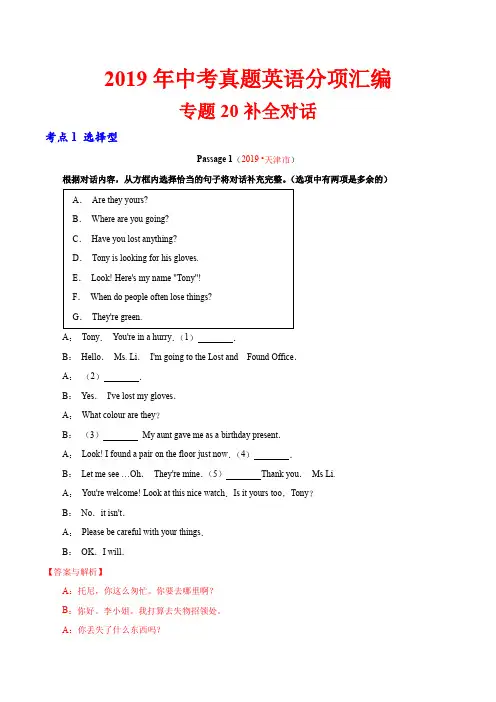
2019年中考真题英语分项汇编专题20补全对话考点1 选择型Passage 1(2019 •天津市)根据对话内容,从方框内选择恰当的句子将对话补充完整。
(选项中有两项是多余的)A:Tony.You're in a hurry.(1).B:Hello.Ms. Li.I'm going to the Lost and Found Office.A:(2).B:Yes.I've lost my gloves.A:What colour are they?B:(3)My aunt gave me as a birthday present.A:Look! I found a pair on the floor just now.(4).B:Let me see …Oh.They're mine.(5)Thank you.Ms Li.A:You're welcome! Look at this nice watch.Is it yours too,Tony?B:No.it isn't.A:Please be careful with your things.B:OK.I will.【答案与解析】A:托尼,你这么匆忙。
你要去哪里啊?B:你好。
李小姐。
我打算去失物招领处。
A:你丢失了什么东西吗?B:是的,我丢了我的手套。
A:它们是什么颜色的?B:绿色的。
我阿姨给我买的一个生日礼物。
A:看!我刚才发现在地上有一双,它们是你的吗?B:我看看。
嗯,它们是我的,看,上面有我的名字托尼!谢谢你,李小姐。
A:不客气,看看这个漂亮的手表,托尼,这也是你的吗?B:不,它不是。
A:请保管好你的物品。
B:好的,我会的。
(1)B 根据下文I'm going to the Lost and Found Office我打算去失物招领处,可知应该要问Where are you going?(2)C 根据下文Yes.I've lost my gloves.是的,我丢失了我的手套。
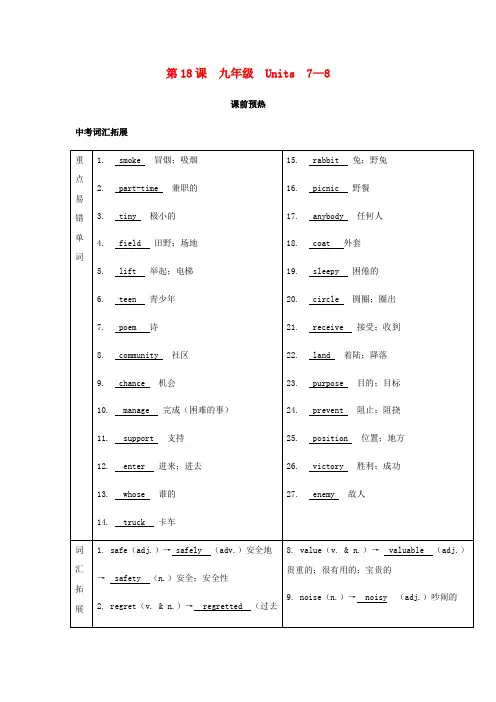
第18课九年级 Units 7—8课前预热中考词汇拓展中考词组短语中考句型回顾课堂突破中考重点单词与短语一、allow的用法【例句展示】1. My parents allow me to see films with my friends on weekends. 我的父母允许我周末与朋友去看电影。
2. In our school, boys are not allowed to have long hair.在我们学校,男生不允许留长发。
【精讲辨析】1. allow作动词,意为“允许”。
2. allow sb. to do sth.允许某人做某事。
3. be allowed to do sth.被允许做某事。
【活学活用】用allow的适当形式填空。
1. —My parents________ me to stay out before 10:00 p.m. at weekends.—You are lucky. I must be back home at 9:00 p.m.2. I think teenagers should________ choose their own clothes.二、pick up的用法【例句展示】1. Would you mind picking it up?你介意把它捡起来吗?2. Could you pick me up at the station?你能在车站捎上我吗?【精讲辨析】pick up为“动词+副词”型短语,代词作宾语时应放两词中间,意为“拾起;捡起;中途载客;收拾;整理”等。
【活学活用】用适当的词填空。
Karin saw some waste paper. She it and threw it into the dustbin.三、get sth. done的用法【例句展示】Anna wants to get her ears pierced.安娜想去打耳洞。
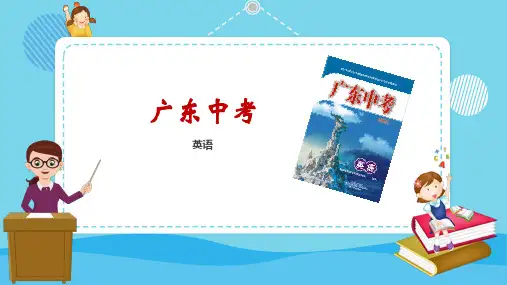
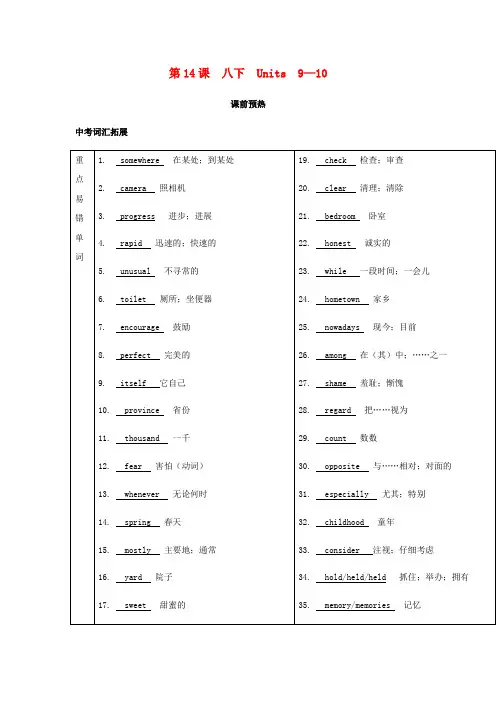
第14课八下 Units 9—10课前预热中考词汇拓展中考词组短语中考句型回顾课堂突破中考重点单词与短语一、encourage的用法【例句展示】This kind of contest encourages people in China to speak English.这种比赛鼓励中国人讲英语。
【精讲辨析】encourage作动词,意为“鼓励”,后接动词不定式。
encourage sb. (not) to do sth. 鼓励某人(不)去做某事。
类似用法的词还有:tell(告诉),invite(邀请),allow(允许),ask(请求),want(想要),promise(答应),wish(希望),expect(预料;盼望;认为)。
【活学活用】用所给词的适当形式填空。
1. When I failed, he always encouraged me__________(try) again.2. They decided__________ (tell) me the truth.二、consider的用法【例句展示】1. Our director is considering Tom’s advice.我们主任正在考虑汤姆的建议。
2. Why not consider visiting Paris?为什么不考虑游览巴黎呢?3. We consider her (as) a good teacher.我们认为她是一个好老师。
4. My mother considers that I should play the violin every day.妈妈认为我应该每天拉小提琴。
【精讲辨析】1. 由例句1、2可知,consider意为“考虑;思考”。
consider后可接名词、代词或动词-ing 形式,但不能接不定式。
2. 由例句3、4可知,consider意为“认为”,与think意思相近。
由例句3可知,consider sb. (as)...意为“认为某人是……”。

中考英语一轮复习情景对话专练1一、补全对话,情景问答1.A: Hello? This is Jenny speaking. ①________B: It's Claudia here.A: How's everything going?B: Too bad. I have too much homework to do every day.A: Me too. I'm really tired. Tomorrow is Saturday. ②_________B: Sounds good. But where can we go?A: Oh. ③__________ I've got three tickets there.B: No, never. But I know it's beautiful. I really want to go there with you. Can you ask Cathy to go with us? A: Sure, I'll call her, We can meet at 8:00 a.m. tomorrow. By the way, ④___________B: It will be sunny, just for us.A: Well.⑤_______________B: Let's meet at the bus station.A: OK. see you tomorrow. Bye!B: Bye!2.A.Can you tell me?B.I'm going to England for my holiday.C.No problem.D.It's not polite to ask personal questions.E.You're welcome.F.What should I call people there?A:Hi,Peter!Where are you going for your winter holiday?B:Hi,Bill!①______.A:I think you'd better know about the rules and customs in England.B:But I don't know. ②_______.A:The first rule is that you should drive on the left﹣hand side of the road.B:What's the next rule?A:And you mustn't ride your bike on the pavement.B:Is there anything else?A:③ For example,"How old are you?""How much are these?"A:④_________ .B:You can call them Mr,Mrs or Miss and surnames.A:Thanks very much.B:⑤____________.3.A: Hi, Liu Si. I haven't see you for days, ①_____B: I have been to Beijing.A: What did you do there?B: ②_____A: Really? How did you perform?B: ③_____A: Congratulation! You're always the best. Whose poem did you choose?B: I chose Li Bai's. He is my favourite poet.A: I love his poems, too. ④_____B: Fantastic. You know, our Chinese ancient poems are really great. We should learn more.A: ⑤_____ It's our duty to keep and spread our traditional culture.B: That's all right.A. I agree with you.B. Where have you been?C. I took part in the Poem Reading Competition.D. And what do you think of the competition?E. I won the first prize.4.请阅读下面短文,根据短文内容,从方框内所给的选项中选出能填入空白处的最佳选项,使短文意思通顺,选项中有一项为多余项。
中考英语情景对话一、打电话1、电话拨通后相互打招呼Hello,is that...speaking?你是...吗?Who is that speaking/calling?你是谁?Who is speaking/calling, please?你是谁?→应答时常说:Yes,(this is)...speaking. 是的,我是....Yes, it’s...here. 我是....2、打电话请对方找人或留言Is...in/at home?xxx在家吗?Can/may/I speak to..., please?请...接电话好吗?Will/would you give a message to..., please?请给...捎个口信好吗?→应答时常说:Hold on/Wait a minute 请等一等I’m sorry...is not in.对不起,...现在不在二、劝告和建议1、You'd better(not)do sth....你最好(不)干...You should do sth. 你应该干....2、Why don't you do sth.?为什么不..../ Why not do sth?为什么不....这是以反问的方式提出劝告或建议,含有建议对方去干某事的意思,而不是询问对方为何不去干某事的原因.3、“Shall we...?”这种句型用于建议对方与自己一起做什么,是一种普通的表示建议的方法。
它和“Let’s..., shall we?”句型可以互换在回答时,如果赞成这个建议,常用“Yes, let's…”或“OK, let's…”→对对方的建议表示同意时常用的答语为:Great太好了,That’s a good idea.真是个好主意。
→对对方的建议表示不同意答语为:I’m afraid that... 我担心...,我恐怕.....I’m afraid not. 恐拍不行。
2019届中考英语复习第一篇语言基础知识第10课八下Units1_2基础知识课前预热中考词汇拓展中考词组短语中考句型回顾课堂突破中考重点单词与短语一、get的用法【例句展示】1. I got good grades in this exam.在这次考试中,我取得了好成绩。
2. She got a letter from Tom.她收到了汤姆的来信。
3. She got angry with her brother.她生她哥哥/弟弟的气。
4. She gets a lot of homework to do every day.她每天有很多作业要做。
5. She often gets home late.她经常迟回家。
6. Her mother got her a dress.她妈妈给她买了一条裙子。
秋天来了,树叶变黄了。
8. We also learn how to get along with others at school. 我们在学校也学习如何与他人相处。
9. I can’t get what you are talking about.我搞不懂你们在说什么。
10. Someone got hit on the head.有人头上被撞了一下。
【精讲辨析】相关短语:get up起床;get (to)到达;get home到家;get ready for...为……做准备;get on(off)上车(下车);get away离开;get back回来;get along(on)with sb.与某人相处;get out of...从……出来;get together相聚;get over克服。
【活学活用】A)用get的适当形式填空。
1. It’s_________ cold. I shall put my coat on.2. She will write to you as soon as she_________ to Guangxi.B)根据汉语提示完成句子。